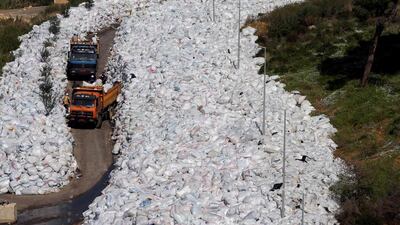In recent months the rules of Lebanon’s political and media landscape have been shaken by the one thing that makes the country go around like no other: money, or rather its absence.
For the Lebanese, this period has been characterised by almost daily revelations of corruption. Corruption surrounded the rubbish crisis that began last July and was resolved only a few weeks ago. Corruption has also reached the internet sector, and was behind a prostitution ring that apparently enjoyed official protection.
In the media sector, meanwhile, most newspapers have faced grave financial difficulties, with Al Safir announcing last month that it intended to close. The decision was later reversed, but it’s unclear whether this was due to a cash injection or because the owner expected one.
These disparate issues are tied together by Lebanon’s habitual dependency on money from outside, particularly from the Gulf, to finance politicians and media outlets. Lately, in the absence of such money, for a variety of reasons, not least falling oil prices, political funding has sharply declined, and politicians especially have had to seek alternative sources of financing.
This situation has been exacerbated by a sharp economic downturn in Lebanon because of the war in Syria. Lebanon has been unable to export its agricultural produce overland; its lucrative tourism sector has dried up, and its poor infrastructure, under pressure from over 1.2 million Syrian refugees, has placed added burdens on the population, who often pay for basic services twice – once to the state, and once to private providers.
When Lebanon was still regarded as a front line in regional rivalries and agendas, Arab states poured funds into the country. This was true during the so-called “Arab cold war” of the 1950s and 1960s, during the years when militant Palestinian groups were present in the 1970s, and again after Lebanon’s war in the 1990s, when reconstruction drew regional investment.
In recent years, however, things have changed. A new generation of leaders in the Gulf has proven less amenable to the idea of buying influence in Lebanon. Amid a regional struggle for power with Iran, heightened by the nuclear deal that has allowed a mending of ties between the west and Tehran, the Gulf states have felt increasingly vulnerable.
In this context, Lebanon has increasingly come to be regarded as an outpost under the control of Hizbollah and Iran – a “fallen position” as some have referred to it. The best illustration of this was the attitude of Saudi Arabia in February, when it suspended a $3 billion (Dh 11bn) military aid package to the Lebanese army. The explanation given by a Saudi general was that the kingdom did not want the weapons to fall into Hizbollah’s hands.
This was disingenuous, since Lebanon’s army has been careful to maintain control over its arsenal, but the episode showed how Lebanon was now viewed in the kingdom. This has been accompanied by determination in Gulf Cooperation Council countries to deport individuals with ties to Hizbollah, a decision affecting many Lebanese expatriates.
In this environment, the big losers have been Lebanese politicians who funded their vast patronage networks with money from abroad. With the domestic economy in crisis, the local money pie has shrunk. This has pushed the more imaginative leaders to consider new ways of getting money.
The rubbish crisis that began in summer 2015 and ended this year is a case in point. It is widely believed that the principal aim in creating the crisis was to ensure a redistribution of rubbish-collection revenues. These were high due to the high price per tonne charged by the company that had a monopoly over collection in Beirut and Mount Lebanon.
Some say the high prices were necessary to pay kickbacks to the different political forces. Yet as money became tight, and the company’s contract ended, some politicians saw an opportunity to take the money more directly by inserting their own companies in the rubbish collection process.
While the intricacy of the issue did not quite allow such an outcome, the bottom line was clear to the Lebanese: they had spent months mired in trash because politicians were fighting over a redistribution of the spoils.
The same holds for the recent internet scandal. Even specialists describe what has happened as immensely complicated. But the upshot is that senior officials have apparently profited from a company that sells bandwidth at a lower price than the official Ogero company, which, officially, has a monopoly over bandwidth distribution.
Among its customers are major state institutions. This means the institutions are participating, maybe unintentionally, in a project defrauding the government.
The scandals cannot all be placed at the door of patronage. Simple greed is usually enough. But patronage is vital because once that power erodes, the ability to secure funding does too.
But all the Lebanese can see is that their country, on the verge of bankruptcy, is being plundered by its politicians. The perilous impact on financial stability is very real.
Michael Young is a writer and editor in Beirut
On Twitter: @BeirutCalling


